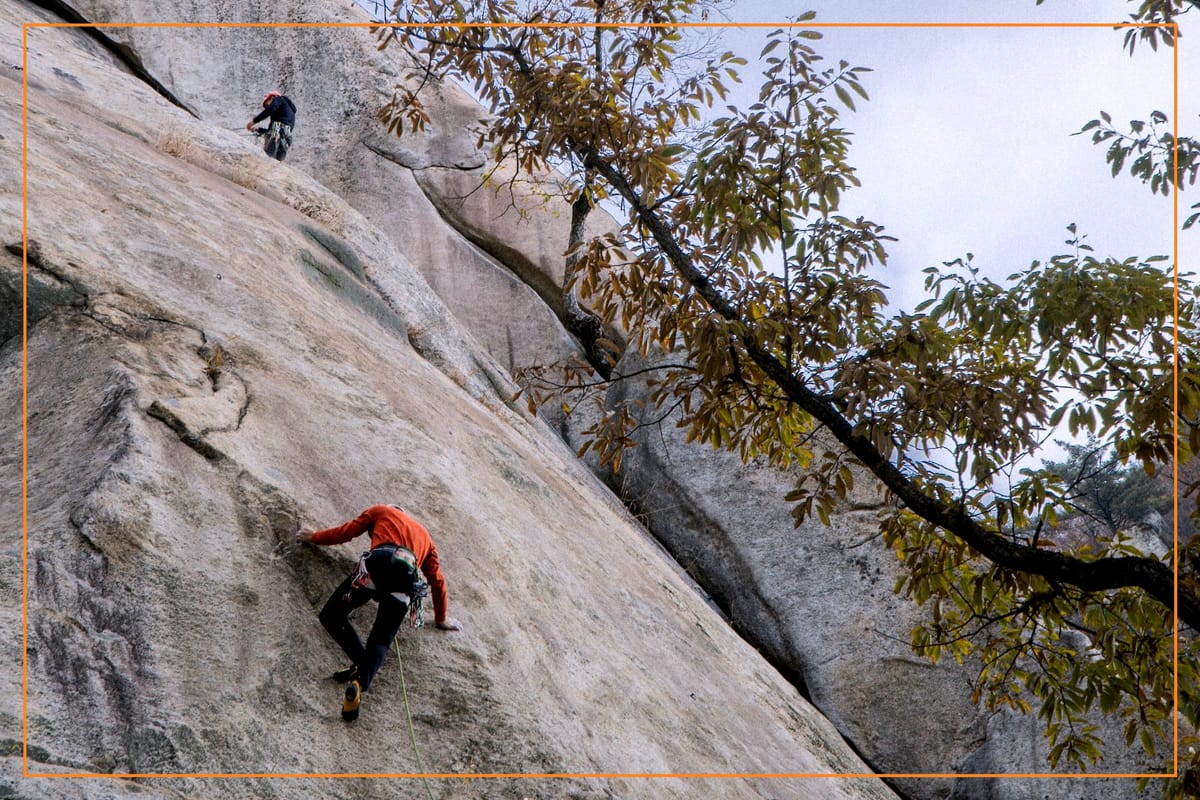Writing is Like Summiting a Mountain
With the many similarities between the sport of climbing and writing, there are several beneficial lessons to take from climbing that can be applied to the writer’s journey.

In a recent essay [1], I discussed getting bit by the procrastination bug before an upcoming writing project. This lead to a metaphor of climbing a mountain in comparison with to the feeling of beginning a new screenplay.
Now, this felt like a very apt metaphor that I wanted to dive into more, but then had a feeling that it was too obvious. It was one of those ideas that may have been novel to me, but not broadly. It was obvious that others had to have made this connection (and written about) before.
Turns out I was right. I checked and found dozens of articles [2] comparing writing to climbing a mountain.
But what I also noticed is that from the select few I did scroll through, none of them quite connected around the approach I was expecting. One reason for this is that it was obvious they’ve never done any climbing. And two it tended to be more philosophical and less nuanced.
So I’m throwing my hat in the ring, giving my take on how screenwriting is like climbing a mountain. Hoepfully with a little more nuance.
To start, I have some climbing experience. By climbing, I mean bouldering, which is unharnessed free climbing on real boulders or simulated boulders in a gym (but different from free soloing). And by experience, I mean I’ve climbed a dozen times at an indoor gym. But in that small practice of the sport, I’ve picked up a decent amount of understanding with details around it — terminology, craft and best practices, and the community support.
While writing my earlier essay, I wasn’t looking for a metaphor. It started small with the general mountain metaphor and grew.
Which brings us to the now, that period right before you begin to write. The second guessing and procrastination creep in (again). It’s that moment when you stand at the foothills of a mountain looking up and are exhausted by just the idea of the climb. There is one more pep talk you need to give yourself to take that first step to climb the mountain.
I want to do this. I want to write this story. I want to summit this mountain…
I kept pulling that thread more, then reigned it in, realizing it was too much of a tonal shift from that essay’s context.
But I wanted to revisit this metaphor as I think there are beneficial lessons to take from climbing that can be applied to the writer’s journey (no matter what type of writing craft). So let’s take a look at the overview of this comparison, or in climbing parlance, map out our route.
All climbing (and stories) start with an intention to explore. Explore a topography. Explore a route. Explore an idea. Explore a perspective. Explore your ability. This intention is what fuels you on your journey.
From here we go into training (brainstorming) then planning (outlining) for phases. Starting at the base (controlling idea) of the mountain (writing journey), we’ve prepared the gear (ideas), conferred on the best route (research), and have that fresh excitement anticipating the journey ahead. It’s as you ascend the mountain to higher elevations with thinning air (writing blocks) and tired muscles (rewriting), that we begin to slow down and give in to the difficulty of the climb.
Now there’s an effect to the body as you climb called ‘pump’. That’s when your forearms build up lactic acid, after sustained griping, holding, and pulling, stiffening your arms and weakening your grip strength. Once you get pump, it becomes very difficult to continue moving in a quick and agile way, and can lead to letting go completely.
Pump is equivalent to our interest and drive toward continuing the script. The longer we’re at it, the longer it takes, the more draining it becomes to stay focused on the process. You lose energy. That’s when the risk of ‘bailing’ on the journey, the story, the script is at its peak.
Pump (sustained interest) will always be a battle, but is multiplied by other obstacles that arise (time, procrastination, doubt) in being able to continue. Giving yourself rest along with finding the right hold and footing while you ascend the mountain is key to battling these challenges along the way.
An underappreciated aspect of climbing is the precision needed in finding that proper hold. In writing, these precision adjustments of your grip and footing are equivalent to all of the thousand of micro decisions made while writing a story. Each time you move during a climb, you’re making a judgement call. You grab a hold with just an index finger, you place the fraction of an inch of your toe in a divot. The tiniest misstep can make or ruin an entire climb.
It’s the same for our character and story decisions. We choose how they react to a situation, how to reveal key information, when to exit a scene, a character’s speaking style, the efficiency of a sentence. These and hundreds more (thousands even) change the complexion and connection to the story.
But we only learn how to navigate this nuance through exploration, practice, doing the work, and above all, falling.
While the climb itself is solo, it is by no means done alone. Another area of synergy between writing and climbing is the community that surrounds it. The climbing community, I have learned, is an immensely social, positive, and encouraging one.
While you are on the face or wall, it's a focused practice between you and gravity, similar to how writing is a solo mental endeavor between you and the page. But around that, engaging with others in a similar circle, allows for a shared experience of learning and encouragement. Where climbers meet at a gym or rock face, writers gather at coffee shops and planned group meets. Having that support system keeps us interested and motivated, reminding us of the fun in the endeavor, and that we’re not alone.
Now, like any metaphor, they are based on generalities of a topic that focuses on similarities, there is one striking difference— the immediacy of success and failure. With climbing, you know instantly if you summited the mountain or have fallen. Writing is more opaque and a slow burn, taking months and years to achieve your goals. But the path to reach your goals is the same.
Climbing is an practice of focus, dedication, persistence, and above all exploration. There is no one way to scale a wall of rock. You have to try different holds, grips, and route to get to the top and find what works for you.
So practice being present, focusing on that first step, then the next one after the that, and don’t be afraid of failing. All of this will give you best chance to reach that peak.





Comments ()